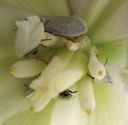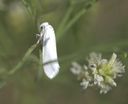Bogus yucca moths
Prodoxus
Classification
- Phylum: Arthropoda
- Subphylum: Hexapoda
- Class: Insecta
- Order: Lepidoptera
- Superfamily: Adeloidea
- Family: Prodoxidae
- Subfamily: Prodoxinae
- Genus: Prodoxus
Pronunciation
How to pronounce Prodoxus: //ˈproʊ.dɒk.səs//
These audio files are automatically generated. While they are not always 100% accurate, they are a good starting point.
Images






Summary
Prodoxus is a genus of moths within the family Prodoxidae, commonly referred to as bogus yucca moths. They are distinct from true yucca moths due to their shape and behavior, feeding on yucca and agave but not facilitating their pollination. The genus comprises 21 recognized species and has been subject to various taxonomic revisions.
Physical Characteristics
Moths of the genus Prodoxus possess a more streamlined shape compared to the true yucca moths (Tegeticula), featuring a smaller thorax that tapers off towards the head.
Identification Tips
Look for the streamlined shape and smaller thorax that differentiates them from true yucca moths. Identification can also involve examining specific wing patterns and colors, which can vary among species.
Habitat
Prodoxus species are typically found in habitats where yucca and agave plants grow, as these are their primary food sources.
Distribution
These moths are distributed across North America, particularly in regions where yucca and agave plants are native. Specific distribution maps can be referenced through USDA resources.
Diet
Members of the genus Prodoxus feed on the vegetative parts of yuccas and agave plants.
Life Cycle
Detailed descriptions of the life cycle are not provided, but like other moths, they undergo complete metamorphosis from egg to larva (caterpillar), pupa, and adult.
Reproduction
The specifics of reproduction in Prodoxus species are not detailed, but generally involve laying eggs on or near host plants (yucca/agave).
Predators
Predation specifics are not detailed, but typical moth predators may include birds, bats, and other insectivorous animals.
Ecosystem Role
Prodoxus species play a role in the ecosystem as herbivores that interact with yucca and agave plants, potentially influencing their growth and health.
Cultural Significance
The name 'bogus yucca moth' was coined to distinguish them from true yucca moths, which have a mutualistic relationship with yucca plants, serving as their pollinators.
Collecting Methods
- Light trapping
- Netting from host plants
Preservation Methods
- Pinning
- Drying in a cool dark place
Similar Taxa
Misconceptions
There is a common misconception that all yucca moths have a mutualistic relationship with yucca plants; however, Prodoxus species are considered 'bogus' because they do not contribute to pollination.
Tags
- moths
- Prodoxus
- bogus yucca moths
- Lepidoptera
- agave
- yucca
- bugs